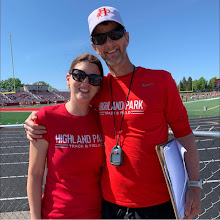I am a runner. Years ago that statement would have meant little more to me than an accidental choice of sport. A leisure-time activity selected for reasons as superficial as the activity itself.
Now I know better. The runner does not run because he is too slight for football or hasn't the ability to put a ball through a hoop or can't hit a curve ball. He runs because he has to. Because in being a runner, in moving through pain and fatigue and suffering, in imposing stress upon stress, in eliminating all but the necessities of life, he is fulfilling himself and becoming the person he is.
I have given up many things in this becoming process. None was a sacrifice. When something clearly became nonessential, there was no problem in doing without. And when something clearly became essential, there was no problem accepting it and whatever went with it.
From the outside, this runner's world looks unnatural. The body punished, the appetities denied, the satisfactions delayed, the motivations that drive most men ignored. The truth is that the runner is not made for the things and people and institutions that surround him. To use Aldous Huxley's expression, his small guts and feeble muscles do not permit him to eat or fight his way through the ordinary rough-and-tumble.
That he is not made for the workaday world, that is essential nature and the law of his being are different from the ordinary and usual is difficult for everyone, including the runner, to comprehend. But once it is understood, the runner can surrender to his self, this law. And become, in the Puritan sense, the "free man," the man who is attached only to the good.
In this surrender, the runner does not deny his body. He accepts it. He does not subdue it, or subjugate it, or mortify it. He perfects it, maximizes it, magnifies it. He does not suppress his instincts; he heeds them. And goes beyond this animal in him toward what Ortega called his veracity, his own truth.
The finished product is therefore a lifetime work. This giving up, this letting go, the detachment from attachments, is an uneven process. You should give up only what no longer has any attraction to you, or interferes with something greatly desired. That was Gandhi's rule. He advised people to keep doing whatever gave them inner help and comfort.
I have learned that also. Whatever I give up, whatever innocent indulgences, ordinary pleasures or extraordinary vices, I do so from inner compulsion, not in a mood of self-sacrifice or from sense of duty. I am simply doing what comes naturally.
For the runner, less is better. The life that is his work of art is understated. His needs and wants are few, he can be captured in a few strokes. One friend, a few clothes, a meal now and then, some change in his pockets, and, for enjoyment, his thoughts and the elements.
And though he's on the run, he's in no hurry. Concerned at times with tenths of a second, he actually responds to the season, moving through cycle and cycle, toward less and less until body and mind and soul fuse, and all is one.
I see this simplicity as my perfection. In the eyes of observers, however, it appears completely different. My success in removing myself from things and people, from ordinary ambition and desires, is seen as lack of caring, proof of uninvolvement, and failure to contribute.
So be it. A larger view of the world might include the possibility that such people are necessary. That the runner who is burning with a tiny flame on some lonely road does somehow contribute. And while a world composed solely of runners would be unworkable, a world without them would be unlivable.
Wednesday, May 13, 2009
I AM A RUNNER
If you're a long-time reader of my blog, you probably realize I like to read running books and often include the passages that I find most interesting within my posts. I've included a lot of Dr. George Sheehan's thoughts along the way. For me, his writings cover a wide spectum and usually lead to one of two reactions; 1) I'm throughly engrossed and I end up reading sections over and over - trying to soak it all in or 2) I'm bored out of my mind and barely able to keep my eyes open - because he's way over my head. Anyway, I cracked open his book, Running & Being, again and thought I would share some of those statements, paragraphs, pages, etc. that I found myself reading over and over.
Subscribe to:
Post Comments (Atom)

2 comments:
I'll have to look up Dr. George and check out some of his work. Thanks for sharing.
Beth, be sure to check back, I plan on posting more of his stuff in the near future.
Post a Comment